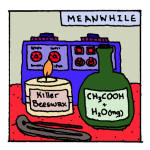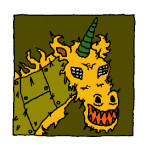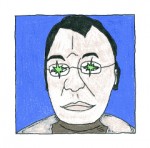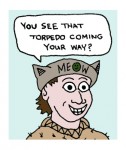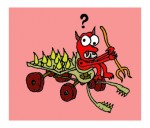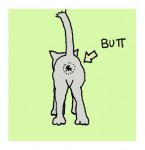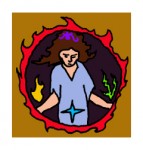There’s this television program I watched back in the day. A show called The Prisoner that played on PBS (The Public Broadcasting Station). My folks and I would huddle around the television set and marvel at The Prisoner’s originality.
Ugh, the term “television” seems so dated now, even though it’s still useful in describing a dominant electronic device in use. Who would ever have guessed television sets would end up being the precursor to the monitor, whose job it is to communicate computer activity to us?
Or that tell-a-vision would become 2-way?
The slot for The Prisoner was set at an hour, but the episode only lasted 45 minutes. Since this was PBS there were no commercials—what a novel concept! A short program based around playing chess took up the remaining 15 minutes.
Jerky stop motion animation of a chessboard and its pieces, accompanied by a measured English voice, described the game as it unfolded. It was entertaining and engaging to my folks and I, so we stayed through to watch it.
But enough talk! The Prisoner is today’s topicality of chitchat.
What Is This Show On?
The Prisoner is about a secret agent (or perhaps he is a highly placed government official with access to sensitive information) who resigns from his job and begins packing for a trip. While he is loading up his suitcase, a group of men break into his home and fill the room he is in with knockout gas.
He awakens to find himself in a high-tech security town known as “The Village”. Everyone is called by a number instead of their real name. His new name is “Number 6”, or just “6”. The Village is self-sufficient, cut-off from the rest of the world, and presided over by a director who is always referred to as “Number 2”. This director is almost always a new person in each episode of the show.
And those are the least weird parts of the place.
For example, The Village relies on security patrols (by foot, helicopter, and boat) to keep people from escaping. But their primary means of recapturing escapees is a gigantic flying blob-sphere called “Rover”.
Rover paralyzes (and sometimes kills) those who go too far, bringing them back by dragging them to a pick up point. The thing also makes really scary roaring and movement noises as it goes about its business.
The series lasts only one season, and consists of attempts by the forces of The Village, led by Number 2, to force Number 6 to answer the question, “Why did you resign?” Every kind of coercion is attempted, from outright physical torture to psychological manipulation involving hypnosis and drugs.
Number 6 tries to escape and resist as best he can. Most of the people who live in The Village are operatives for whatever political force runs the secret prison; many of them are undercover, posing as prisoners themselves.
Some inhabitants are genuine prisoners like Number 6 who usually think he’s “one of them”, or are too far broken down to be of use. Mainly it’s up to Number 6 to muster enough wits and skill to keep from being broken.
What Is This Post On About?
Okay, so if you haven’t seen this series yet then stop here and go watch it! I’m about to go into spoiler territory, so ahrooo!
The final episode of The Prisoner has provoked heated discussion over what it means. Basically Number 6 eventually turns the tables on his captors and is invited into the inner circle of power to join them as their new leader, or to depart.
In a surreal unfolding of events, Number 6 leads a machine gun attack on the inner circle and causes what looks like the destruction of The Village. He and a few compatriots escape back to the real world, where these helpers resume their roles in society. Number 6 drives off into the sunset. The number on the door of his home says “1”.
What does the ending mean? How does it explain the events of The Village? Many viewers were expecting a sophisticated puzzle ending. Here’s what’s been moving through my brain as I consider the meaning of the show for me.
The entire series represents a complex hallucination in which his captors attempt to brainwash him into a state of compliance, whereupon he can do no harm as an independent agent. The elites of political entities really hate those independent agents.
At the end, Number 6 manages to overcome this hallucination and return to reality, symbolized by him leaving his home and driving off into the sunset, or the endless horizon of freedom.
Which can also be interpreted as a return to the cycle of the beginning of the series, but I think this only reinforces a closure of a complete experience in which Number 6 is no longer Number 1 or Number 6, but Number 0—a fool free to roam at will through any boundary or state of mind.
The last episode is a collapse of the hallucination and the return of sanity. He has escaped his role as Number 1 (the leader of the system of coercion and repression which he served)—the mysterious butler is the part of him that “served” this system in his capacity as Number 1—and he has escaped his role as the prisoner, Number 6.
The inner circle would prefer he resume his post or be broken. They divide his personality in an attempt to either cause his complete mental breakdown or remake him into his old role. Perhaps they are the same thing!
However, instinct triumphs over programming. His stubborn refusal to give up his identity (“I am not a number, I am a free man!”), to cling to the zero as it were, preserves him.
Number 6 asks, “Who is Number 1?” and he is always answered, “You are Number 6.” This is said in plain sight of the television watching audience many times. He doesn’t catch the comma in that answer, nor does the audience! “YOU ARE, Number 6.”
What’s That Again?
The interesting thing for me is how the conflict is always framed in terms of Number 6’s refusal to answer the question, “Why did you resign?” The thing is, Number 6 answers this question at one point—that his conscience was bothering him about what he was doing. Being Number 1 must have meant decisions that led to the suffering and death of not only many establishment agents, but innocent people as well.
For example, when Number 2 kills number 73 (an innocent woman), Number 6 reacts with brutal efficiency in destroying the man. It must have been a similar incident—the death of an innocent in the performance of his duties—that led to Number 6 questioning his role. He gained back part of his soul when he felt remorse, and this in turn led to him to suddenly react against the system.
That Number 6 finally gives an answer—and this answer is ignored-—shows that his captivity isn’t about information at all. It is about obedience. The concern about his resignation is a pretense for removal of his identity and re-education. Send him to the Gulag, folks! Just make sure it is “justified” by some official reason. That is, mask the real issue.
Number 6 tries to tell the inner circle but they shout him down. “I, I, I!” The magistrate looks on at Number 6’s anguished face. He understands as Number 6 realizes, it has never been about his stand of conscience, or the fear of his going over to “the other side”—is there such a thing when the inner circle is both black and white in dress? Where the system is total and complete?
There is only one political force—ownership. They merely argue over method.
The Number 2 destroyed by Number 6 returns to initiate the last and most brutal interrogation of Number 6 before the final episode. The inner circle must have believed using this personality piece was key to breaking 6’s will. But I think by this point they had already lost the upper hand and were clutching at straws.
For this Number 2 is, in effect, a form of Number 6’s own past persona. The part of him that initiated Number 6’s development out of the previous trauma involving the dead woman. He has, in effect, betrayed the system by self-recreating his own conscience and therefore a person who does not fit under the typical number system.
Number 2 is “destroyed”. He is “dead”. The truth of self-captivity ended his ability to perform his duties. Number 6 is free to go.
This Number 2 is brought back to life and put on trail as an example of a “betrayer”, who bites the hand that feeds him. But it is a futile gesture. Nature trumps the system in the end, always. Number 6 is who our protagonist is now, and putting his old identity on a rocket to be shot into space is no use.
Not that the inner circle won’t try to place all the “bad” personalities into that rocket in hopes of being left with only a butler (Number 1).
The young man gunfighter Number 8 from the Living In Harmony episode is brought onto trial as well (as Number 48). He is put forward as an example of youth that does not rebel in the societally accepted way. He is guilty of rebelling with no purpose, rhyme or reason—not unlike the fool.
This nemesis “kid” was used by the system to threaten others, but he had a drawback. He was difficult to control and extremely violent. Youth stifled and manipulated is a dangerous tool to the system. When we allow the system to send youth out to kill those who oppose repression, we create dysfunctional individuals.
By refusing to fight, as Number 6 did in this episode, one threatens the source from which coercion draws the strength of its force. Displaying a character who held this kind of basic stance of non-violence was the reason the episode was not allowed to be shown in the U.S. at the time.
It’s revealed that the Living In Harmony episode has been a hallucination within a hallucination in an attempt to get Number 6 to either resume his former post as gunslinger for the ownership or be a victim of his immature personality of violence and confusion, to be “destroyed” by his shadow as it were.
Number 6 “killed” Number 8. By refusing to strap on a gun and a badge at the same time, Number 6 showed that he wished to remain independent.
Number 48 will also be going up into space on the rocket.
I, I, I!
Number 6 is sent into the rocket to meet with Number 1. Meaning he will either end up in the tube with Number 2 and Number 48 (who are both laughing and babbling insanely) to be blasted off and disposed of, or he will emerge in a form suitable for control once more.
In the rocket, Number 6 meets a figure wearing the mask of the inner circle. He strips the mask away only to reveal an ape’s mask underneath. He strips more masks off. Finally he comes face to face with himself as the figure is revealed to be—himself! The two of them struggle, the unmasked version of himself laughing maniacally and babbling like a fool.
A fool. His true self!
Number 6 attacks the guards and frees Number 2 and Number 48. They lead a counterattack against the inner circle; launching the rocket in a surreal confrontation of energies that can only mean the fundamental construct of the hallucination can no longer be defended.
Isn’t that what the system is, after all? A shared imaginary space we participate in? But as they say in gaming circles, “system matters”. Dysfunction leads to typhoid game play and “fun, never.”
Rover is destroyed, melted to slag. His job was to maintain the boundaries of the hallucination. In the episode Many Happy Returns, Number 6 actually manages to escape back to the real world for a brief time. There is no “Rover” or guards to stop him. The purpose of letting Number 6 temporarily escape was only to fool him into thinking The Village was a literal place. But it never was!
As the hallucination collapses, the personalities return to their appointed places in the psyche as the “world” becomes more real. We were only a short drive from London after all! The youth, Number 48, goes off to hitchhike. Number 2 goes off to a job in the government. The butler enters the residence of Number 6. All the personalities within our fool protagonist return to their proper place in the psyche (and appropriate memories).
Number 6 gets in his car and drives off into the sunset/sunrise of consciousness. He is free to go. At the very least he will awaken and perhaps find himself in a real captivity, but one in which he can actually physically escape from.
It is the fool who encourages us to resign, to claim our life as our own, and to reject numbers altogether. At the end of the adventure he comes around to encourage us to begin anew.
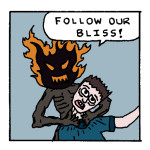 When I was younger I used to think this campus was a golden land of opportunity and adventure. Then I got wise to the unconscious riptides of the place and have changed my mind.
When I was younger I used to think this campus was a golden land of opportunity and adventure. Then I got wise to the unconscious riptides of the place and have changed my mind.
